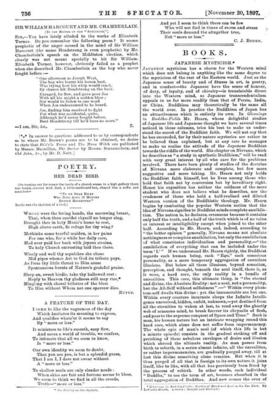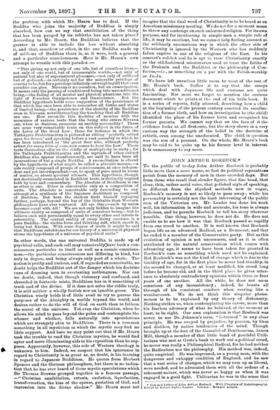BOOKS.
JAPANESE MYSTICISM.*
JAPANESE mysticism has a charm for the Western mind which does not belong in anything like the same degree to the mysticism of the rest of the Eastern world. Just as the Japanese sense of beauty and of fitness in art, in poetry, and in conduct—the Japanese have the sense of honour, of duty, of loyalty, and of chivalry—is translatable direct into the Western mind, so Japanese transcendentalism appeals to us far more readily than that of Persia, India, or China. Buddhism may theoretically be the same all the world over. In practice the Buddhism of Japan has an attractiveness which is entirely its own. In Gleanings in Buddha-Fields Mr. Hearn, whose delightful studies of Japanese life and Japanese thought we have several times noticed in these columns, tries his best to make us under- stand the secret of the Buddhist faith. We will not say that he has succeeded, for by their nature mysteries are rather to be believed than explained, but at any rate he manages to make us realise the attitude of the Japanese Buddhist towards the riddle of the world. His chapter on Nirvana, which he describes as "a study in synthetic Buddhism," will be read, with very great interest by all who care for the problems involved. There have been plenty of studies of the doctrine of Nirvana more elaborate and complete, but few more suggestive and more taking. Mr. Ream not only holds the Buddhist faith himself, but he lives among those who hold that faith not by conversion but by hereditary right. Hence his exposition has neither the coldness of the mere student who does not believe what he describes, nor the crudeness of those who hold a half-realised and diluted Western version of the Buddhistic theology. Mr. Hearn begins by combating the popular Western notion that the idea of Nirvana signifies to Buddhist minds complete annihila- tion. The notion is, he declares, erroneous because it contains only half the truth, and a half of the truth which is of no value or interest or intelligibility except when joined to the other half. According to Mr. Hearn, and, indeed, according to " the better opinion " generally, Nirvana means not absolute nothingness or complete annihilation, but only the annihilation of what constitutes individualism and personality,—" the annihilation of everything that can be included under the term I." If we understand Mr. Hearn rightly, the Buddhist regards each human being, each " Ego," each conscious personality, as a mere temporary aggregation of countless illusions. But below all these illusions, beyond sensation, perception, and thought, beneath the soul itself, there is, as it were, a hard core, the only reality in a bundle of unrealities. This core, this ultimate thing, is "the eternal and divine, the Absolute Reality: not a soul, not a personality, but the All-Self without selfishness" :—" Within every phan- tom-self dwells this divine : yet the innumerable are but one. Within every creature incarnate sleeps the Infinite Intelli- gence unevolved, hidden, unfelt, unknown,—yet destined from all the eternities to waken at last, to rend away the ghostly web of sensuous mind, to break forever its chrysalis of flesh, and pass to the supreme conquest of Space and Time." Such is man, his human nature but an intricate wrapping round this hard core, which alone does not suffer from impermanency. The whole epic of man's soul (of which this life is but a minute episode) consists in the gradual striking off and perishing of these nebulous envelopes of desire and illusion which shroud the ultimate reality. As man passes from birth to rebirth, in a series almost infinite, all the unrealities, or rather impermanencies, are gradually purged away, till at last this divine something alone remains. But when it is thus purged of all that is foreign to its own nature it joins itself, like to like, with all that has previously been freed by the process of rebirth. In other words, each individual " Buddha," to use the term of art, becomes absorbed in the total aggregation of Buddhas. And now comes the crux of • Gleanings in Bud Ilia-Fields: Stwdirs of Hand and Soul in the Far East. By Lat.•edio Beam. LOIR101:1 Garner and Bretatv.
the problem with which Mr. Hearn has to deal. If the Buddha who joins the majority of Buddhas is simply absorbed, how can we say that annihilation of the thing that has been purged by its rebirths has not taken place P According to Mr. Hearn, the Buddhist believes that the greater is able to include the less without absorbing it, and that, somehow or other, in the one Buddha made up of millions of Buddhas there is, as it were, both a general and a particular consciousness. Here is Mr. Hearn's own attempt to wrestle with this paradox :—
" This giving up not only of one life, but of countless lives,— not only of one world, but of innumerable worlds,—not only of natural but also of supernatural pleasures,—not only of selfhood but of godhood,—is certainly not for the miserable privilege of ceasing to be, but for a privilege infinitely outweighinglall that even paradise can give. Nirvana is no cessation, but an emancipation. It means only the passing of conditioned being into unconditioned being,—the fading of all mental and physical phantoms into the light of Formless Omnipotence and Omniscience. But the Buddhist hypothesis holds some suggestion of the persistence of that which has once been able to remember all births and states of limited being,—the persistence of the identity of the Buddhas even in Nirvana, notwithstanding the teaching that all Buddhas are one. How reconcile this doctrine of monism with the assurance of various texts that the being who enters Nirvana can, when so desirous, reassume an earthly personality? There are some very remarkable texts on this subject in the Sutra of the Lotos of the Good Law : those for instance in which the Tathigata Prabhfitartltna is pictured as sitting perfectly extinct upon his throne,' and speaking before a vast assembly to which he has been introduced as • the great Seer who, although perfectly extinct for many laitis of ;eons, now comes to hear the Law.' These texts themselves offer us the riddle of multiplicity in unity ; for the Tathigata Prabhiltaratna and the myriads of other extinct Buddhas who appear simultaneously, are said to have been all incarnations of but a single Buddha. A reconciliation is offered by the hypothesis of what might be called a pluristie monism,—a sole reality composed of groups of consciousness, at once indepen- dent and yet interdependent,—or, to speak of pure mind in terms of matter, an atomic spiritual ultimate. This hypothesis, though not doctrinally enunciated in Buddhist texts, is distinctly implied both by text and commentary. The Absolute of Buddhism is one as ether is one. Ether is conceivable only as a composition of units. The Absolute is conceivable only (according to any attempt at a synthesis of the Japanese doctrines) as composed of Buddhas. But here the student finds himself voyaging farther, perhaps, beyond the bar of the thinkable than Western philosophers have ever ventured. All are One ;—each by union becomes equal with All ! We are not only bidden to imagine the ultimate reality as composed of units of conscious being,—but to believe each unit permanently equal to every other and infinite in potentiality. The central reality of every living creature is a pure Buddha: the visible form and thinking self, which encell it, being but Karma. With some degree of truth it might be said that Buddhism substitutes for our theory of a universe of physical atoms the hypothesis of a universe of psychical units."
In other words, the one universal Buddha is made up of psychical cells, and each cell may conceivably:have both a con- sciousness particular to itself as well as a cosmic conscious- ness,—the particular consciousness not differing in kind, but only in degree, and being always only part of a whole. The notion is pretty and curious, and, if regarded as conceivable, no doubt helps the Buddhist out of the danger which his doctrine runs of dooming men to everlasting nothingness. Nor can we doubt, indeed, that though visionary and confused, and shrouded in fantastic mists, Buddhism has in it something of truth and of the divine. If it does not solve the riddle truly, it is still neither a wholly foolish nor an ignoble guess. The Christian wisely bolds it of little avail to try to pursue the purposes of the Almighty in worlds beyond the world, and desires rather to do the will of God on earth than to fathom the secret of the universe. Yet even the Christian, when he allows his mind to pass beyond the poles and contemplate the whence and whither, falls naturally into speculations which are strangely akin to Buddhism. There is a common something in all mysticism in which the mystic may find no little support. And here we may point out that if Mr. Hearn took the trouble to read the Christian mystics, he would find apter and more illuminating aids to his exposition than he sup- poses. Apparently, however, this side of Western theology is unknown to him. Indeed, we suspect that his ignorance in regard to Christianity is as great as, no doubt, is his learning in regard to Japanese Buddhism. He quotes from Herbert Spencer and the German philosophers, but there is no indica- tion that he has ever heard of those mystic speculations which Sir Thomas Browne grouped together in A. famous passage, —" Christian annihilation, extasis, evolution, liquefaction, transformation, the kiss of the spouse, gustation of God, and ingression into the divine shadow." Mr. Hearn must not imagine that the final word of Christianity is to be heard at an American missionary meeting. We do not for a moment mean to throw any contempt on such unlearned religion. For its own purpose, and for inculcating in simple men a simple rule of life, it may be excellent, but we cannot help feeling amused at the sublimely unconscious way in which the other side of Christianity is ignored by the Western who has suddenly fallen captive to one of the religions of the East. In his convert's red-hot zeal he is apt to treat Christianity exactly as the old-fashioned missionaries used to treat the faiths of the Brahmin and the Buddhist or the philosophy of Con- fucins,—i.e., as something on a par with the Fetish-worship or Jn-Ju.
We have left ourselves little room to treat of the rest of Mr. Hearn's book. Suffice it to say that the essays which deal with Japanese life and customs are quite fascinating. Nor must we forget to mention the curious document which he prints at the end of his little book. It is a series of reports, fully attested, describing how a child at the beginning of the present century asserted its recollec- tion of a former birth, and how on investigation he (the child) identified the place of his former birth and recognised his former parents. We cannot say that on the face of it the evidence looks at all first-rate, but the story shows in a very curious way the strength of the belief in the doctrine of rebirth, even among the uneducated. The child in question was the son of a peasant. On the whole, Mr. Hearn's book may be said to be quite up to his former level in interest. It is unnecessary to say more.























































 Previous page
Previous page